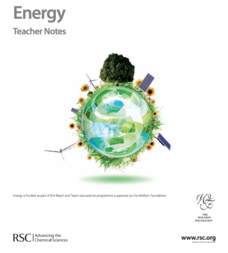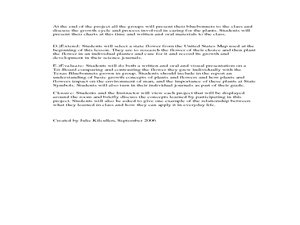Kenan Fellows
Letter Writing to Politicians on Environmental Issues
Let your voices be heard! Pupils research local and national environmental concerns using the Internet. Class members determine an issue they deem important and draft a letter to a local politician expressing their...
University of Georgia
Splat!
What does viscosity have to do with splatter? An activity shows that the viscosity of a substance is inversely proportional to the distance of its splatter. Learners conduct the experiment by collecting data, graphing, and analyzing...
Serendip
Golden Rice – Evaluating the Pros and Cons
More than half the world's population eats rice as a daily staple ... imagine if that rice could prevent illness. Scientists genetically engineered rice to include vitamin A for just that purpose. However, room for debate still exists....
Curated OER
Perceived Risks
Students rank a list of everyday risks to compare with classmates. They rate each risk on both its ability to be controlled and its observability in the environment. Results are graphed.
Royal Society of Chemistry
Energy—Gifted and Talented Chemistry
What has more energy than a room full of pupils after a fire drill? This lesson plan! Explore the changes in energy during different chemical reactions, discover why some reactions feel cold and others feel hot, and tackle the concept of...
Curated OER
Cancer and the Cell Cycle - Biology Teaching Thesis
Identify the different stages of mitosis and what occurs in each stage with a straightforward biology activity. Young scientists identify the importance of the cell cycle control in maintaining homeostasis, and then match the...
Curated OER
How Does Your Blue Bonnet Grow?
Students explore the conditions needed to grow Texas Blue Bonnets. In this Blue Bonnet planting lesson, students recognize the differences in Texas Blue Bonnet. Students record their findings in a graphs and analyze their results.
National Center for Case Study Teaching in Science
A Strange Fish Indeed
Communication is one of the most important aspects of science. In a two-day activity, your high school or college-level biologists will read excerpts from a fictional diary of Marjorie Courtenay-Latimer, the woman who discovered the...
Nevada Outdoor School
Let It Snow! Let It Melt!
Winter weather offers a great opportunity to teach young scientists about the states of matter. This activity-based lesson includes a range of learning experiences, from experimenting with the rate at which ice melts...
NOAA
Currents
Learn how ocean currents are vital to humans and marine life. The eighth installment of a 23-part NOAA Enrichment in Marine sciences and Oceanography (NEMO) program, focuses on ocean currents and how they affect global climate. The...
Curated OER
The Greenhouse Effect
In this Earth Science worksheet, learners read about the Greenhouse Effect and the difference between natural and amplified warming. Following, they answer ten short answer questions related to what they read about global climate issues.
Orange County Water Atlas
Location, Location, Location…
Young geographers discover not only how to read and recognize coordinates on a map, but also gain a deeper understanding of latitude and longitude and how climate changes can vary significantly across latitudes.
University of Colorado
Using Spectral Data to Explore Saturn and Titan
Saturn's rings are made of dust, ice, and solid chunks of material. Individuals use spectrographs in this final installment of 22 lessons to determine the atmospheric elements. They analyze spectrums from Titan's atmosphere and...
Messenger Education
Sensing the Invisible: The Herschel Experiment
The electromagnetic spectrum includes everything from very powerful gamma rays (which are used to treat cancer) to much weaker radio waves (which include microwaves). Through a hands-on activity, scholars explore the temperature...
Curated OER
Request
Students play a game of questioning with the teacher after reading silently a beginning passage of text. They and teacher request specific information from each other until students are able to summarize and predict the outcome of the...
Curated OER
KORN-TV Newsroom
Role-play to learn. Writers pretend to be a team of news writers. They research information about genetically engineered corn and the impact of biotech food products. Then create a video, Powerpoint, or oral presentation to present their...
Curated OER
D Block Elements: Complex Ions and Oxidation States
Students investigate transition metals and their oxidation states. In this complex ion and oxidation states lesson plan, students use 6 transition metals and mix them with ligand solutions and oxidizing agents separately. They test their...
NASA
Rover Races
Operating a vehicle remotely can be difficult, especially when the vehicle is on another planet. Young engineers get a feel for some of the real-world challenges as they work to program their rovers (blindfolded group members)...
Education Outside
Papermaking
Imagine recycling food scraps and using them to make paper. The directions are all here in a seven-page packet that details several paper-making strategies.
NASA
Pop! Rockets
Off they go — launching rockets is fun. The lesson plan contains templates to build paper rockets that can be launched from a PVC pipe launcher. Individuals or groups build the rockets and determine the shapes for their fins. Included...
Virginia Department of Education
Determining Absolute Age
How can radioactive decay help date old objects? Learners explore half-life and radioactive decay by conducting an experiment using pennies to represent atoms. Young scientists graph data from the experiment to identify radioactive decay...
Teach Engineering
Exploring Acceleration with an Android
Small groups use rubber bands to accelerate an Android device along a track of books. They collect the acceleration data and analyze it in order to determine the device's velocity.
Channel Islands Film
Santa Cruz Island - Writing for Information
After re-viewing a documentary segment on the restoration of Santa Cruz Island,, individuals craft an essay in which they compare the views of the various stake holders featured in the video and identify the point of view they find...
NASA
Connecting Models and Critical Questions
Scholars use data to analyze and determine which sets of information need to be counted. They create a model to explain differences among chemical elements using graphs to prove concept mastery.

























